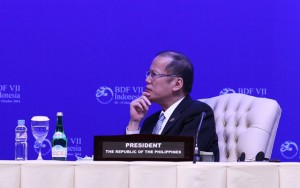PRESIDENT Benigno Aquino 3rd on Friday said he finds authoritarian rule “tempting” because “this might promise immediate gains” but quickly clarified that such method of governance will not succeed without the “consent and support of the governed.”
Speaking at the opening session of the 7th Bali Democracy Forum on the Evolving Regional Democratic Architecture held at the Bali International Convention Center in Indonesia, Aquino said some leaders are tempted to take such a route out of frustrations and for other reasons that hinder the realization of their plans.
“As leaders, all of us here have had our share of frustrations borne of the many factors that sometimes hinder the realization of our vision. This breeds the temptation to consider an authoritarian method, as this might promise immediate gains,” the President told his audience, including Indonesian President Susilo Bambang Yudhoyono and other leaders of the Association of Southeast Asian Nations (Asean).
“Sitting down and reflecting on this idea, however, we realize that, with the lack of consensus and consent from the people, such a mode, which offers quick, short-term gains, may be detrimental to society in the long-run,” he added.
Aquino, who has expressed “openness” to a term extension if there is public clamor for it, also explained that without clear popular support, an authoritarian rule is doomed to fail.
“That lack of consensus, combined with the great degree of dissatisfaction that inevitably arises, leads to instability and the eventual collapse of that particular system,” he stressed.
He made the remark as he narrated an incident during his recent trip to the US when he was asked by a student if he “missed the good old days, particularly the stability fostered by authoritarianism.”
“As you might know, my family and I lived in exile in Boston for a good three years, and obviously, as a member of a family victimized by an authoritarian regime, I could not share the sentiment. Instead I wondered: What were good about those days? The discussion with that member of our youth gave me the impetus to reflect even more on the matter,” said the President.
As experienced in the Philippines and other countries, he noted that in a totalitarian regime, things get done faster, whether they are right or wrong, because there are no checks and balances in place.
“Very often, the consent and support of the governed are neither sought nor attained. Naturally, such a regime, one divorced from the desires of its people, will have weak foundations. In that kind of regime, might I point out, the opinions and wishes of the governed are only second to the objective of staying in power,” Aquino said.
He claimed that these regimes failed primarily because political survival becomes the “end all and be all” of the government.
“And as we have seen in history, all authoritarian regimes, regardless of the cause of their coming to power, will at one point make political survival the end all and be all of government,” he said.
Only recently, a survey firm reported that majority of the people do not favor an extended term for Aquino.
I also found that majority do not agree that the powers of the judiciary, an instrument of check and balance, should be clipped.
Aquino expressly opposes the fact that “judicial reach” has been “abused.” He lamented that the Supreme Court, for one, has stepped on the toes of the Executive. The President publicly ridiculed the Court for ruling that several provisions of the Disbursement Acceleration Program (DAP) were unconstitutional.
In his Bali speech, the President underscored the benefits of a democratic state which, he maintained, “presents more stable, more solid foundations for equitable advancement.”
“In a democratic state, which is the opposite of an authoritarian regime, government is systematically attuned to the voice of the people; it represents the people and works towards the betterment of its people. And while consensus building, which is the foundation of such a state, may be a long and complicated process,” he said.
“Democratic institutions, after all, seek to free and enable its citizens, and the first freedom should always be from hunger, as my father once thought. In turn, that empowered citizenry becomes capable of nurturing and fostering democracy. This ultimately redounds to a virtuous cycle of inclusiveness, stability, and development,” Aquino said.


